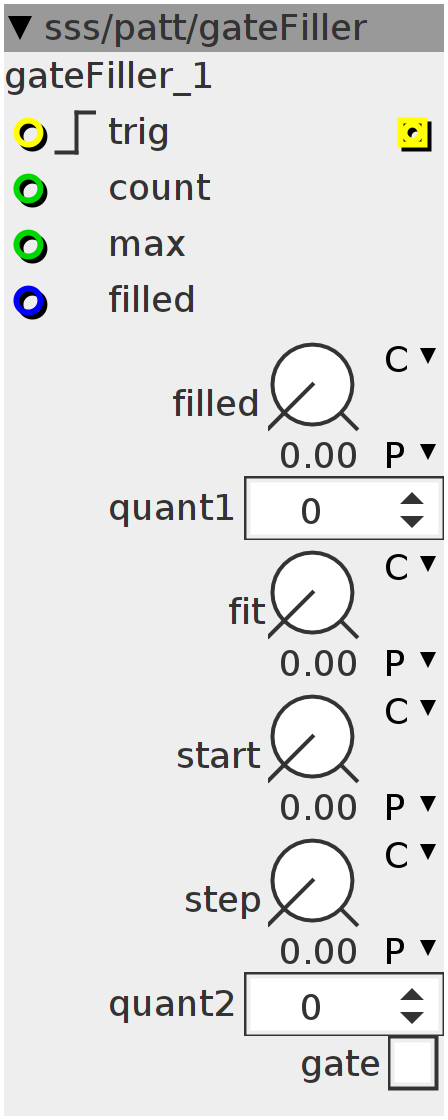gateFiller
Euclidian gate generator and random "trigger-filler". Randomly fills up the array with gates until the desired amount of gates is reached. When the "filled" control is dailed up, it randomly adds more and more gates to the remaining positions. When the "filled" control is dialed down, it randomly removes more and more gates from the array. Controlling the "filled" externally wil slowely transform the randomised pattern. Next to the random gates, there's also an euclidian pattern generator. -start sets the start-count-offset (when zero, first gate on will always be on the first count). -step sets the stepsize between gates (when set to 5, each next fifth position in the array will be high, wraps when max-count is reached) -fit sets the amount of steps that will be set high. NOTE! Depending on the stepsize and quantification this could or could not fill up the entire array: when max is set to 32 and stepsize is 4, it will repeat putting the same positions to a gate high over and over, skipping all other positions. -Quantification controls set the division that the notes may be filling (eight, quarter, half, whole beat) The higher the setting, the larger the quantification step (power of 2).
Inlets
bool32.rising trigger
int32 count
int32 max
frac32 filled
Outlets
bool32 v
Parameters
frac32.u.map filled
frac32.u.map fit
frac32.u.map start
frac32.u.map step
int32 quant1
int32 quant2
bool32.tgl gate
static const uint32_t LENGTH = 64;
uint8_t val[LENGTH];
int ntrig;
int i;
int used;
int32_t filled;
int32_t total;{
for (i = 0; i < LENGTH; i++)
val[i] = 0;
}
ntrig = 0;total = inlet_max;
total = total > 0 ? total : 1;
total = total > LENGTH ? LENGTH : total;
filled =
___SMMUL(total << 3, __USAT(___SMMUL(param_filled + inlet_filled,
((1 << 27) - param_fit << 3) << 2) +
param_fit,
27)
<< 2);
int32_t fit = ___SMMUL(total << 3, param_fit << 2);
int32_t start = ___SMMUL(total << 3, param_start << 2);
int32_t step = ___SMMUL(total << 3, param_step << 2);
if ((inlet_trig > 0) && !ntrig) {
for (i = 0; i < LENGTH; i++) {
val[i] = 0;
}
ntrig = 1;
} else if (inlet_trig < 1) {
ntrig = 0;
}
for (i = 0; i < fit; i++) {
int k = i * step + start;
val[(k - (k / total) * total >> param_quant2) << param_quant2] = 1;
}
used = 0;
for (i = 0; i < LENGTH; i++) {
used += val[i];
}
if (used < filled) {
val[((int32_t)(GenerateRandomNumber() % (total)) >> param_quant1)
<< param_quant1] = 1;
}
if (used > filled) {
val[(int32_t)(GenerateRandomNumber() % (total))] = 0;
}
outlet_v = val[inlet_count] & (inlet_trig || (param_gate));